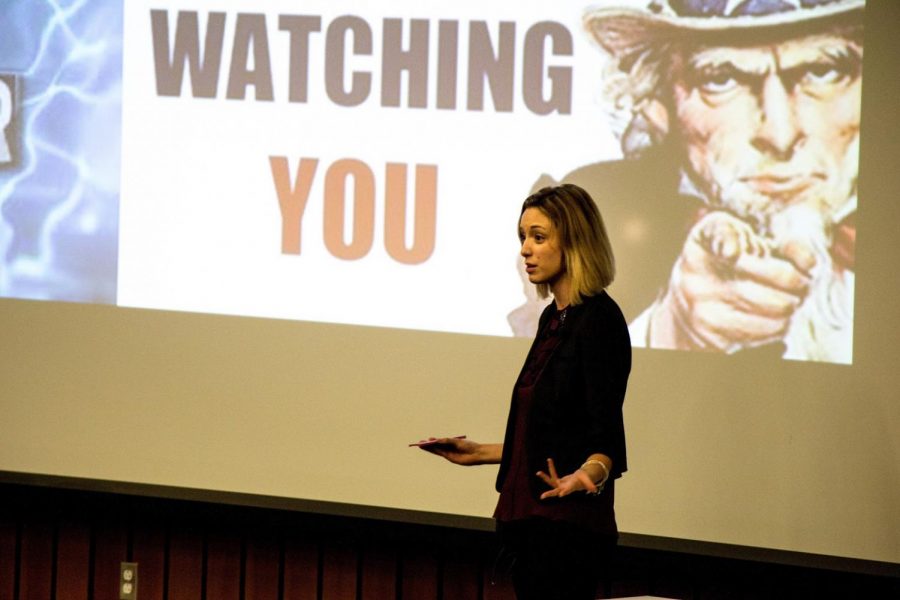Speculative Features event discusses integration between science, humanities
Haley Kennedy, a sociology major student, presenting in “Speculative Futures — Imaginging Futures” at the Electrical and Computer Engineering (ECE) Building Auditorium on Nov. 4, 2017. “Speculative Futures” is a two-day series of talks and interactive events by scientists and creative writers about the intersections between science, technology, and literature.
Nov 6, 2017
The Speculative Futures event aimed to encourage interdisciplinary collaboration between the sciences and the humanities this weekend, touching on topics ranging from cutting-edge research to science and speculative fiction.
Students and educators were then able to think about how a science-humanities approach to technology could influence its outcome.
The event took place at the National Center for Supercomputing Applications on Friday from 5:30-7 p.m., and at the Electrical and Computer Engineering Building on Saturday from 2-4:30 p.m.
Normand Paquin, associate director of research at the Coordinated Science Laboratory, and Antoinette Burton, director of the Illinois Program for Research in the Humanities and professor in the Department of History, tackled this issue with help from fellow scientists and humanists through the Speculative Futures event.
After over two years of planning, Paquin and Burton both hosted the anticipated Speculative Futures two-day event.
Get The Daily Illini in your inbox!
Speculative Futures featured interactive demonstrations at the NCSA, English undergraduates discussing the possibilities of future technological research and a speaker panel from the humanities discussing technological implications today.
Melissa Littlefield, associate professor of English and kinesiology, participated in establishing the science-humanities bond. Littlefield teaches a pilot science fiction class of mixed majors called Speculative Futures and is proud to see her students overcome the challenges of talking across the disciplinary divide.
“I love to open up opportunities for people to see the kind of energy that can happen when you get scientists and social scientists and humanists in a room,” Littlefield said. “I hope that when my students go out into the real world, they’ll be able to have conversations across disciplinary boundaries and find out that they’re all equal players in these debates and conversations about technology moving forward.”
With help from researchers at the Beckman Institute and the CSL, Littlefield recruited graduate student engineers who allowed her Speculative Futures students to shadow them in their labs and research.
After the event students gained enough background knowledge on the science behind the research, they were free to imagine big-picture applications for them — utopian and dystopian.
Inspired by their engineering counterparts, Littlefield’s students delivered Pecha Kucha-style talks detailing their takes on the future of engineering research and explored its deeper meaning to humanity at large.
Exercises like these, which consider the reasons behind our technology, can even help determine its directions in the future. Paquin said as technology moves forward, we need to have conversations about the larger implications of each new step in our scientific progress.
This conversation allowed attendees to think about what it really means to be human while technology is omnipresent and machines grow smarter by the minute.
“As machines become able to make decisions more independently, there are all sorts of issues surrounding how human beings can accept that and how we can build trust with those machines, in terms of relying on them,” Paquin said.
Professor Lynne M. Thomas, five-time Hugo Award winner and head of the Rare Books and Manuscript Library, moderated the audience’s question-driven discussion with Saturday’s speaker panel.
She emphasized the importance of bonding science and the humanities, especially through creative mediums like science fiction and story-writing.
“Humans tell each other stories. It’s how we define and experience our world with one another. We tell each other stories through the words that we use and through the things we produce,” Thomas said. “They’re all ways of telling each other stories about who we think we are and who we want to be. The best innovations come out of efforts to make those stories relatable to as many people as possible. Those are the things that change lives.”
Thomas also said the University specifically fosters the right sort of interdisciplinary connections in surprising ways.
“People start talking about their research and suddenly new inventions happen or we cure something, because those two people who were in radically disparate fields had a conversation with one another,” Thomas said. “That’s totally a University of Illinois experience.”
Thomas said discussions about science fiction and technology may not only influence our scientific progress but our relationships with one another as human beings in a community.
“There are all sorts of economic arguments for why merging the sciences and the humanities make good economic sense. For me, I’m here because it gives people joy, and there is not enough of that in life,” Thomas said. “My hope is that people came away from this event with a bit of a sense of joy about what they experienced, and then that they turn around and find their personal way of putting their joy back into their communities. That’s the ripple effect I live for.”






